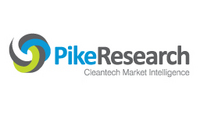BOULDER, CO--February 29, 2012: After a long gestation period, the fuel cell industry has reached a significant turning point. To date, the industry has been supported to a very large degree by government-funded R&D and subsidies. Now, however, an increasing number of industries are moving to adopt fuel cells in limited volumes based on economic and business factors. Leading developers are experiencing double- and even triple-digit growth rates (from an admittedly low base). For the industry to move into a period of sustained and healthy growth, the supply chain must become capable of providing high-quality, economically competitive critical components. At the same time, without a growing industry, the supply chain cannot benefit from component standardization, volume manufacturing, and cost reductions. According to a new report from Pike Research, continued growth in manufacturing capacity and further progress down the cost curve will require significant investments in capital equipment over the next several years to support advanced manufacturing processes. As a result, the cleantech market intelligence firm believes that significant attrition will occur in the supply base over the next few years.
“With total 2011 revenue for the entire fuel cell supply base of only $295 million, the next few years will be a critical time for suppliers”
"With total 2011 revenue for the entire fuel cell supply base of only $295 million, the next few years will be a critical time for suppliers," says research director Kerry-Ann Adamson. "Although we anticipate a certain amount of contraction along the supply chain in the short term, we believe that this will make the industry in general stronger and more resilient, by the 2015-2016 time frame."
The proton exchange membrane (PEM) fuel cell stack supply chain comprises a mix of privately-held companies with fuel cell-specific expertise developed to serve this market and divisions of large companies that have repurposed existing capabilities for the same reason. Pike Research has identified 70 companies active in the PEM fuel cell stack supply chain, spread relatively evenly across the various components (membranes, bipolar plates, gas diffusion layers, and so on). Overall, 55% of the companies are located in Asia Pacific and Europe, but a number are based in North America as well.
Pike Research's report, "The Fuel Cell Stack Supply Chain", focuses on suppliers of the components that make up the fuel cell stack including catalysts, membranes, membrane electrode assemblies (MEAs), gas diffusion layers (GDLs), and bipolar plates (BPPs) for proton exchange membrane (PEM) fuel cells, high temperature PEM (HT-PEM) fuel cells, and direct methanol fuel cells (DMFC). The study includes an evaluation of the market opportunities and key constraints in the fuel cell supply chain, along with an assessment of the key commercial stage companies active in this market. Detailed market size figures and forecasts are included for each component category through 2017, segmented by world region. An Executive Summary of the report is available for free download on the firm's website.
Pike Research is a market research and consulting firm that provides in-depth analysis of global clean technology markets. The company's research methodology combines supply-side industry analysis, end-user primary research and demand assessment, and deep examination of technology trends to provide a comprehensive view of the Smart Energy, Smart Grid, Smart Transportation, Smart Industry, and Smart Buildings sectors. For more information, visit Pike Research or call +1-303-997-7609.



